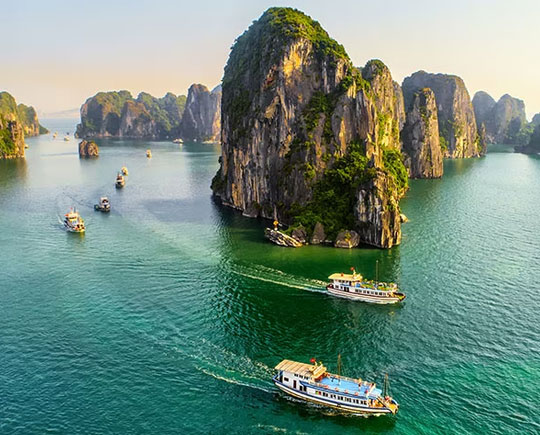
2. Multiple-Entry Visa: Enter Vietnam multiple times.
3. E-Visa: Apply online for a short stay.
4. Visa on Arrival: Get a visa at the airport.
A completed visa application form.
A recent passport-sized photograph.
A copy of your passport.
Proof of accommodation in Vietnam.
A travel itinerary.
Financial documents (like bank statements or pay slips).
Online Application (eVisa):
1. Visit the Official Website: Go to the Vietnam eVisa portal.
2. Fill Out the Application Form: Provide personal details, travel information, and upload a passport-sized photo.
3. Pay the Fee: Use a credit or debit card to pay the visa fee.
4. Submit Your Application: Review your information and submit the form.
5. Receive Your eVisa: You will receive your eVisa via email within 3 business days. Print it out for travel.
Offline Application:
1. Gather Required Documents: Prepare your passport (valid for at least 6 months), completed application form, passport photo, and payment.
2. Visit the Embassy or Visa Center: Locate the nearest Vietnamese embassy or visa center in India.
3. Submit Your Application: Hand in your documents and pay the visa fee.
4. Wait for Processing: Processing typically takes 3-5 business days. Collect your passport with the visa when ready.
For a smooth experience, ensure all documents are complete before submission. Safe travels!
2. Visa Application Form: Complete the form accurately and sign it.
3. Passport-Size Photographs: Provide two recent color photographs (4x6 cm).
4. Proof of Accommodation: Include a hotel booking confirmation for your stay in Vietnam.
5. Flight Itinerary: Submit a copy of your round-trip flight reservation.
6. Proof of Financial Stability: Provide recent bank statements to demonstrate sufficient funds for your stay.
7. Invitation Letter: Required if you are visiting friends or family; must be signed by your host in Vietnam.
8. Other Supporting Documents: Include proof of employment or any additional documents that may support your application.
Ensure all documents are complete and accurate to facilitate a smooth visa application process.
The visa application fee for Indian citizens is approximately $25 for a single-entry visa. Payment can be made online via credit/debit cards or in-person at the nearest Vietnamese embassy or consulate. If your visa application is rejected, the fee is typically non-refundable. Its important to submit all required documents to minimize the risk of rejection. For the most accurate and up-to-date information, always check the official Vietnamese government website or contact the embassy directly.
After passing through customs, you may need to declare any items that exceed the duty-free limits. It's advisable to keep your passport and visa handy, as you may need to present them during these checks.
During your stay in Vietnam, you are not required to register with local authorities unless you plan to stay in a hotel or other accommodation that does not automatically handle registration for you. In such cases, your hotel will typically assist with the necessary paperwork.
Always ensure you have travel insurance and keep emergency contact numbers accessible. Enjoy your trip to Vietnam!
Address: 50-M, Shanti Path, Chanakyapuri, New Delhi, Delhi 110021
Phone: +91-11-2419-1597
Email: vnemb.in@mofa.gov.vn
Website: Embassy of Vietnam in India Consulate General of Vietnam in Mumbai
Address: 5th Floor, Raheja Chambers, 213 Nariman Point, Mumbai, Maharashtra 400021
Phone: +91-22-2202-3779
Email: vnconsulate.mumbai@mofa.gov.vn
Yes, Indian citizens are required to obtain a visa before traveling to Vietnam.
2. How can I apply for a tourist visa to Vietnam?
You can apply for a tourist visa through the Vietnamese embassy or consulate in India, or you can apply online for an e-visa if you meet the eligibility criteria.
3. What is the duration of stay allowed with a tourist visa?
A Vietnam tourist visa typically allows you to stay for up to 30 days. However, you can apply for an extension if needed.
4. Can I travel to Vietnam without a visa if I have a layover?
If you are only transiting through Vietnam and do not leave the airport, you do not need a visa. However, if you plan to leave the airport, a visa is required.
5. What documents do I need to apply for a tourist visa?
You will need a valid passport, a completed visa application form, recent passport-sized photographs, and proof of accommodation in Vietnam. Additional documents may be required depending on your application method.
6. Is it possible to extend my tourist visa while in Vietnam?
Yes, you can apply for a visa extension at the local immigration office in Vietnam, but it is advisable to do this before your visa expires.
7. What is the cost of a tourist visa for Indian citizens?
The visa fee varies depending on the type of visa and the processing method. It is best to check with the embassy or consulate for the most accurate pricing.
Check the denial letter for specific reasons and gather any supporting documents that address these issues.
Submit your appeal to the relevant Vietnamese embassy or consulate within the specified timeframe mentioned in the denial letter. 2. Reapplying:
Review the reasons for your initial denial and rectify any issues in your new application.
Prepare a complete set of documents, including proof of finances, travel itinerary, and a clear explanation of your travel purpose.
Submit your new application and be prepared for a possible interview. Always ensure that you follow the latest guidelines from the Vietnamese embassy or consulate, as requirements may change.
In the early centuries, Indian traders and monks traveled to Vietnam, bringing with them not only goods but also religious beliefs and practices. This led to the establishment of Mahayana Buddhism in Vietnam, which still plays a significant role in Vietnamese culture today.
Additionally, both countries celebrate vibrant festivals that reflect their unique traditions, yet share a common theme of honoring ancestors and community. For example, the Vietnamese Tet and the Indian Diwali both emphasize family gatherings, feasting, and paying respects to those who came before.
This historical and cultural bond continues to thrive today, with both nations collaborating in various fields, including trade, education, and tourism.